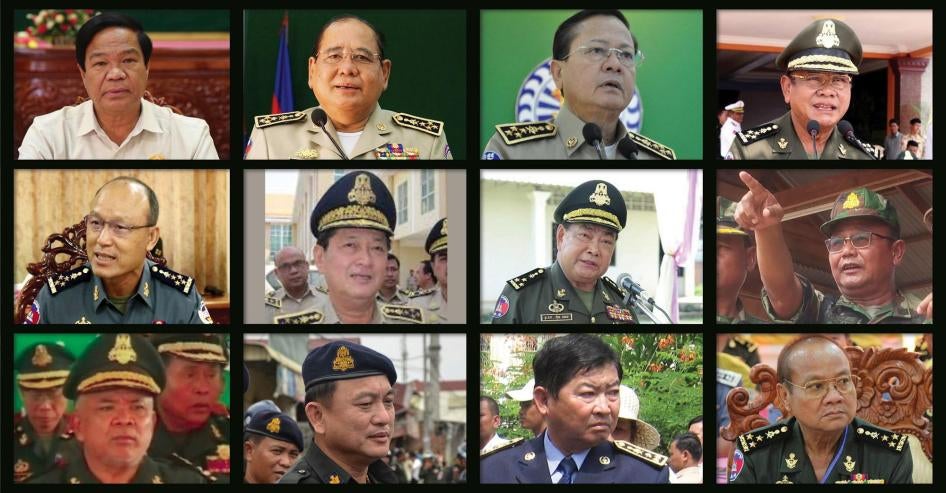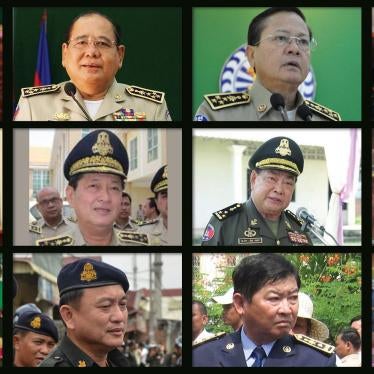Cambodian Prime Minister Hun Sen’s crackdown on dissent is in full swing ahead of national elections later this month. But who are the generals around Hun Sen who act like a praetorian guard protecting him and the ruling party, helping to crush or eliminate political opponents, and then obstructing efforts at accountability?
In June, Human Rights Watch released a new report, “Cambodia’s Dirty Dozen,” profiling 12 senior generals in the military, police and gendarmerie who are responsible for serious and systematic human rights violations. They owe their senior positions in the security forces to their political and personal links with Hun Sen.
The abuses in which the 12 are implicated include violations of human rights, war crimes, and crimes against humanity committed from the 1970s to the present. Most of the 12 have been implicated in the use of unnecessary, excessive, and sometimes lethal force against protests about unfree and unfair elections, land confiscations, labor abuses, and low wages. Many have also been involved in non-political abuses against the ordinary population, such as land takings, murder, torture, and arbitrary detention.
Some, like Pol Sarouen and Kun Kim, are running as Cambodian People’s Party candidates in the upcoming election.
The Australian government has invested many millions of dollars to promote democratic reform and rule of law in Cambodia over the years. Yet the corrosive effect of the politicized leadership of the Cambodian security services and impunity for human rights violations thwarts these efforts.
To begin to address this problem, the Australian government should support independent investigations into these individuals and others involved in serious human rights violations in Cambodia.
And as a matter of urgency it should place a travel ban on these officials and any others involved in human rights violations to prevent them from traveling to Australia.
Australia still provides training to Cambodian security forces and it’s possible that some of these generals may travel to Australia for training programs or holidays. In assessing visa applications, the Department of Immigration and Border Protection considers “relevant public interest criteria, including foreign policy interest, national security and character requirements,” which would include credible allegations of human rights abuses.
In addition to travel bans, the Australian government should go one step further and impose asset freezes against these generals and against senior members of the ruling Cambodian People’s Party (CPP), which has been in power for almost 40 years through repression and massive corruption. The Autonomous Sanctions Act 2011 allows for imposing these kinds of targeted sanctions in situations of international concern, such as “the grave repression of the human rights or democratic freedoms of a population by a government.” However, the government has used these measures very rarely.
Other governments like the US and Germany have imposed some targeted sanctions against senior officials of the Cambodian military and government, and the European Union has threatened economic and targeted sanctions if the Cambodian government continues to blatantly violate people’s rights.
Australia has already joined two statements at the UN Human Rights Council expressing "deep concern about the recent serious decline of civil and political rights in Cambodia." But its bilateral diplomacy has been more muted, perhaps due to the ongoing refugee resettlement arrangement with Cambodia and Cambodia’s imprisonment of the Australian filmmaker James Ricketson on bogus espionage charges.
But Cambodia’s culture of impunity needs to be addressed head-on, not ignored or downplayed. Abusive Cambodian officials need to understand that there is a cost to their actions, if not in Cambodia, then at least abroad.









